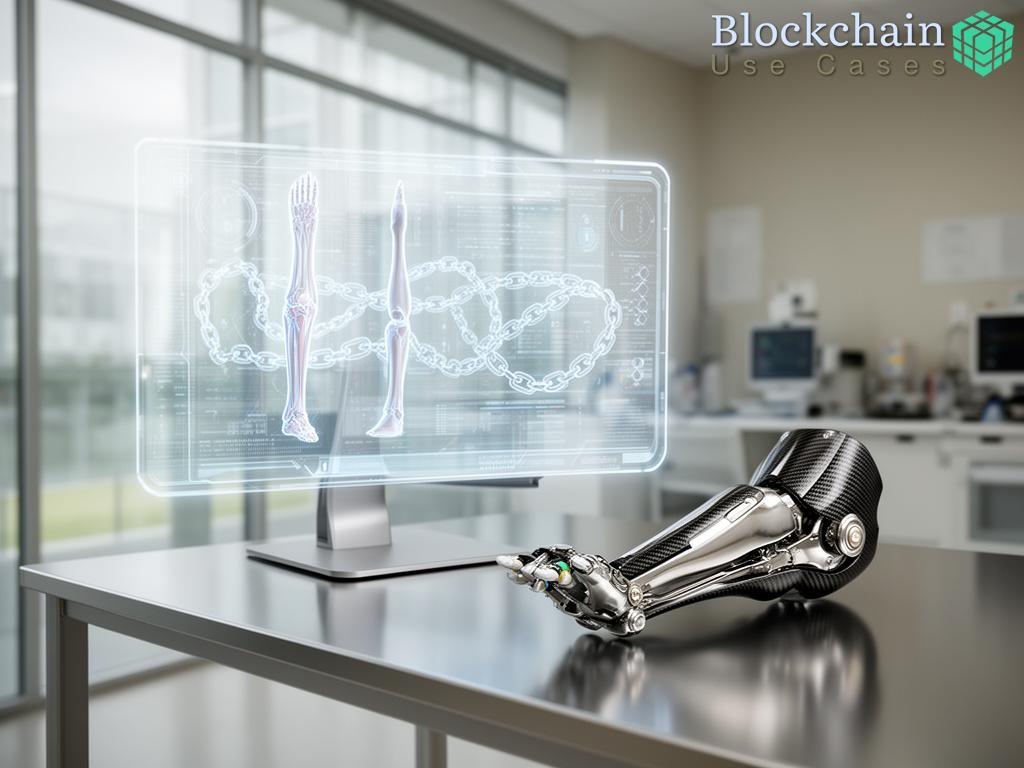Enhancing Accountability in Grant Distribution
The allocation of healthcare research grants has long been a complex process, often marred by inefficiencies and a lack of transparency. As funding becomes increasingly critical in advancing medical research, the need for accountability in grant distribution is paramount. Blockchain technology emerges as a powerful tool, promising to revolutionize how grants are managed and disbursed, ensuring that every dollar is tracked and every decision is documented.
At its core, blockchain is a decentralized ledger that records transactions across multiple computers, ensuring that the data is immutable and transparent. By implementing this technology in healthcare grant distribution, organizations can provide a clear trail of funding from source to recipient. This shift not only enhances transparency but also builds a culture of accountability among stakeholders.
Consider the following comparison of traditional grant management versus blockchain-based systems:
| Aspect | Traditional Management | Blockchain-Based Management |
|---|---|---|
| Transparency | Limited visibility, prone to mismanagement | Full visibility, every transaction is recorded |
| Accountability | Difficult to trace fund allocation | Easy traceability of funds and decision-making |
| Fraud Prevention | Vulnerable to manipulation | Immutable records reduce risk of fraud |
| Efficiency | Time-consuming processes | Streamlined operations with automated workflows |
The implementation of blockchain in healthcare research grant distribution not only benefits funding organizations but also empowers researchers and institutions. With a transparent system, researchers can track their grant applications and understand the funding landscape better. This visibility fosters trust among researchers, funding bodies, and the public, ensuring that resources are utilized effectively and ethically.
Moreover, as stakeholders become more aware of where and how funds are being allocated, there is a collective responsibility to ensure that the objectives of research grants align with the overarching goals of improving healthcare outcomes. By enhancing accountability through blockchain, the healthcare research community can work together towards a more equitable distribution of resources, ultimately leading to groundbreaking advancements in medical science.
Improving Data Integrity and Security
As the healthcare sector increasingly embraces digital solutions, the integrity and security of data become paramount. In the context of healthcare research grants, where the stakes are high, the potential for mismanagement and data breaches poses significant risks. Blockchain technology offers a robust framework that not only enhances data integrity but also fortifies security measures, making it an essential tool for modern grant management.
One of the most compelling advantages of blockchain technology is its decentralized nature. By dispersing data across a network of computers, blockchain minimizes the risk of single points of failure. This decentralized architecture ensures that data related to grant distribution is not only accurate but also resistant to tampering. Each transaction is cryptographically secured and linked to the previous one, creating an unalterable chain of records.
In an age where data breaches can lead to catastrophic consequences, the security protocols embedded in blockchain systems are a game changer. These systems utilize advanced cryptography to protect sensitive information, ensuring that only authorized parties can access specific data. With healthcare research grants often involving confidential patient information and proprietary research findings, blockchain’s security features provide peace of mind to researchers and funding organizations alike.
To better understand the transformative impact of blockchain on data integrity and security in healthcare grant management, consider the following key advantages:
- Immutable Records: Once data is recorded on the blockchain, it cannot be altered or deleted, ensuring that all information remains intact and verifiable.
- Enhanced Access Control: Blockchain allows for fine-tuned access permissions, meaning only designated individuals can view or edit sensitive data.
- Real-Time Auditing: The transparent nature of blockchain facilitates real-time monitoring and auditing of grant distribution, making it easier to identify discrepancies quickly.
- Increased Trust: With secure and verified data, stakeholders can trust that the information regarding grant allocations is accurate and reliable.
The integration of blockchain technology in managing healthcare research grants not only addresses the challenges of data integrity and security but also fosters a culture of trust and accountability. As organizations increasingly recognize the importance of safeguarding sensitive data, blockchain stands out as a pioneering solution that aligns with the ethical responsibilities of the healthcare research community.
Streamlining Application Processes through Smart Contracts
The complexity of grant applications in healthcare research often leads to delays and frustration for researchers and funding bodies alike. As competition for funding intensifies, the need for a more efficient application process has never been more critical. By integrating smart contracts into the blockchain framework, organizations can automate and streamline the entire grant application process, ultimately enhancing the experience for all stakeholders involved.
Smart Contracts: The Heart of Automation
At their core, smart contracts are self-executing agreements with the terms of the contract directly written into code. This innovative technology allows for automatic execution of actions when predefined conditions are met. In the context of healthcare research grants, smart contracts can eliminate the cumbersome back-and-forth communication typically required during the application process. For instance, once a researcher submits their application, the smart contract can automatically verify eligibility criteria, validate required documentation, and even initiate funding disbursement upon approval.
Efficiency and Transparency Combined
The deployment of smart contracts not only enhances efficiency but also ensures transparency throughout the application process. Each action taken within the smart contract is recorded on the blockchain, providing a clear and immutable audit trail that stakeholders can reference at any time. This visibility fosters trust among researchers, funding bodies, and the public, as all parties can track the status of applications in real time. Furthermore, by reducing the manual intervention required, organizations can allocate resources more effectively, focusing on higher-value activities rather than administrative tasks.
Mitigating Risks and Enhancing Compliance
The integration of smart contracts into grant management also significantly mitigates risks associated with fraud and non-compliance. Since smart contracts execute automatically based on predefined conditions, the potential for human error is greatly reduced. This reliability ensures that funds are allocated only when specific requirements are met, thereby enforcing compliance with funding guidelines. The decentralization of data on the blockchain further protects against manipulation, providing a secure environment for all financial transactions related to healthcare research grants.
The adoption of smart contracts in the management of healthcare research grants represents a pivotal shift toward greater efficiency and transparency. As the landscape of medical research continues to evolve, leveraging such technologies will not only streamline application processes but also reinforce accountability and trust within the community. By embracing these innovations, stakeholders can work collaboratively to advance healthcare research, ensuring that valuable resources are utilized effectively to drive meaningful outcomes.
Facilitating Real-Time Tracking of Fund Utilization
In the dynamic realm of healthcare research, the allocation and usage of funds play a pivotal role in determining the success of projects aimed at improving patient outcomes. The advent of blockchain technology introduces an innovative solution that empowers researchers, funding organizations, and stakeholders alike to monitor the utilization of grants in real time. This transformative capacity not only fosters a transparent environment but also enhances the accountability of all parties involved.
The integration of blockchain in grant management enables stakeholders to access up-to-the-minute information regarding fund allocation and utilization. This immediacy allows for informed decision-making and facilitates discussions that can lead to timely adjustments in project execution. The ability to track funds in real time ensures that every dollar is accounted for, creating a culture of responsibility and trust among researchers and funding bodies.
Real-time tracking through blockchain technology offers a clear picture of how funds are utilized within healthcare research projects. This capability is essential for identifying inefficiencies and potential mismanagement. By providing stakeholders with a comprehensive overview of fund allocation, the blockchain system allows for an in-depth analysis of spending patterns, ensuring that resources are directed toward impactful research.
Consider the following key benefits of real-time fund tracking:
- Transparency: Every transaction is recorded on an immutable ledger, enabling stakeholders to view fund flows at any time.
- Accountability: Researchers must justify expenditures, enhancing responsible financial management.
- Compliance Monitoring: Real-time insights ensure adherence to funding guidelines, reducing the risk of non-compliance.
- Data-Driven Adjustments: With instant access to financial data, stakeholders can make proactive decisions to reallocate funds as needed.
By facilitating real-time tracking of fund utilization, blockchain technology not only enhances transparency but also contributes to improved research outcomes. Continuous monitoring allows for timely interventions when deviations from planned expenditures occur, ensuring that projects remain aligned with their original objectives. Furthermore, the ability to provide detailed reports on fund utilization to stakeholders reinforces a commitment to ethical practices and responsible research funding.
The future of healthcare research funding lies in the adoption of innovative technologies like blockchain, which offer unparalleled transparency and accountability. As the landscape continues to evolve, embracing these advancements will be crucial for maximizing the impact of healthcare research initiatives.
Promoting Collaborative Research through Decentralization
The integration of blockchain technology in the management of healthcare research grants not only enhances transparency and accountability but also fosters an environment conducive to collaborative research. By decentralizing data management, researchers and funding organizations can transcend traditional barriers, paving the way for innovative partnerships that address complex healthcare challenges. The decentralized nature of blockchain empowers stakeholders to engage in collaborative efforts without the constraints of conventional funding mechanisms, ultimately driving forward the pace of medical research.
One of the most significant advantages of blockchain in healthcare research grant management is its ability to facilitate shared access to data among diverse research entities. This shared access encourages collaboration by enabling researchers from different institutions to work together more effectively. With a common platform for data exchange, researchers can pool their resources, share insights, and build upon each other’s findings, leading to a more comprehensive understanding of healthcare issues.
The trust deficit often inherent in collaborative research can be mitigated through the transparency provided by blockchain technology. By ensuring that all transactions and data exchanges are recorded on an immutable ledger, stakeholders can have confidence in the integrity of the information being shared. This trust is essential for fostering long-term collaborations, as researchers are more likely to engage in projects when they are assured that their contributions are recognized and that the data will remain secure and accurate.
In the realm of healthcare research, the collaborative potential unlocked by blockchain technology is profound. Here are some of the key benefits:
- Enhanced Innovation: Decentralized platforms encourage diverse teams to brainstorm and innovate, leading to groundbreaking discoveries.
- Resource Optimization: By pooling resources, researchers can minimize duplication of efforts and maximize the impact of their work.
- Accelerated Research Timelines: Improved communication and data sharing can significantly reduce the time needed to progress from concept to clinical application.
- Cross-Disciplinary Synergies: Blockchain enables the merging of expertise from various fields, enhancing the quality and applicability of research findings.
By leveraging the decentralized capabilities of blockchain, the healthcare research community can cultivate an ecosystem where collaboration thrives. This approach not only accelerates the advancement of medical science but also ensures that research initiatives are more aligned with the real-world needs of patients and healthcare providers.





